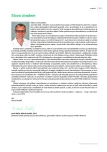Comments on the most important and recent studies involving PCSK9i
Authors:
Richard Češka
Authors‘ workplace:
Centrum preventivní kardiologie III. interní kliniky 1. LF UK a VFN v Praze
Published in:
Vnitř Lék 2018; 64(12): 1137-1141
Category:
Actualities
Overview
The paper provides a brief overview of the key studies focused on PCSK9 inhibitors. It mainly examines positive results of the FOURIER studies on evolocumab, the SPIRE study on boccocizumab and the ODYSSEY Outcomes study on alirocumab. All these studies have not only shown a significant decrease in LDL-cholesterol levels, but also the reduction of cardiovascular events just correlating with these levels. The treatment leading to a dramatic drop in LDL-cholesterol levels was safe and well tolerated by patients. All the studies provided with comments demonstrate a positive impact of biological treatment of hypercholesterolemia on cardiovascular disease and confirm validity of the hypothesis saying “the lower the better”, at least for LDL-cholesterol. In conclusion, Professor Braunwald’s hypothesis is mentioned saying that this treatment might eventually lead to as much as eradication of atherothrombotic cardiovascular diseases.
Key words:
alirocumab – bococizumab – evolocumab – FOURIER – cardiovascular disease – LDL-cholesterol – ODYSSEY Outcomes – SPIRE
Sources
- Sabatine MS, Giugliano RP, Keech AC et al. Evolocumab and clinical outcomes in patients with cardiovascular disease. N Engl J Med 2017; 376(18): 1713–1722. Dostupné z DOI: <http://dx.doi.org/10.1056/NEJMoa1615664>.
- Catapano AL, Graham I, De Backer G et al. 2016 ESC/EAS Guidelines for the management of dyslipidaemias. Eur Heart J 2016; 37(39): 2999–3058. Dostupné z DOI: <http://dx.doi.org/10.1093/eurheartj/ehw272>.
- Giugliano RP, Mach F, Zavitz K et al. Evaluation of cognitive function in a randomized trial of evolocumab. N Engl J Med 2017; 377(7): 633–643. Dostupné z DOI: <http://dx.doi.org/10.1056/NEJMoa1701131>.
- Caswell J. Why Cholesterol Matters. Dostupné z DOI: <http://heartinsight.heart.org/Summer-2017/Why-Cholesterol-Matters>.
- Halcox JP, Tubach F, Lopez-Garcia E et al. Low Rates of Both Lipid-Lowering Therapy Use and Achievement of Low-Density Lipoprotein Cholesterol Targets in Individuals at High-Risk for Cardiovascular Disease across Europe. PLoS One 2015; 10(2): e0115270. Dostupné z DOI: <http://dx.doi.org/10.1371/journal.pone.0115270>.
- Nordestgaard BG, Chapman MJ, Humphries SE et al. Familial Hypercholesterolaemia is Underdiagnosed and Undertreated in the General Population: Guidance for Clinicians to Prevent Coronary Heart Disease. Eur Heart J 2013; 34(45): 3478–3490. Dostupné z DOI: <http://dx.doi.org/10.1093/eurheartj/eht273>.
- Sabatine MS, Giugliano RP, Wiviott SD et al. Efficacy and Safety of Evolocumab in Reducing Lipids and Cardiovascular Events. N Engl J Med 2015; 372 : 1500–1509. Dostupné z DOI: <http://dx.doi.org/10.1056/NEJMoa1500858>.
- Koren MJ, Lundqvist P, Bolognese M et al. Anti-PCSK9 monotherapy for hypercholesterolemia: the MENDEL-2 randomized, controlled phase III clinical trial of evolocumab. J Am Coll Cardiol 2014; 63(23): 2531–2540. Dostupné z DOI: <http://dx.doi.org/10.1016/j.jacc.2014.03.018>.
- Blom DJ, Hala T, Bolognese M et al. A 52-week placebo-controlled trial of evolocumab in hyperlipidemia. N Engl J Med 2014; 370(19): 1809–1819. Dostupné z DOI: <http://dx.doi.org/10.1056/NEJMoa1316222>.
- Koren MJ, Giugliano RP, Raal FJ et al. Efficacy and Safety of Longer-Term Administration of Evolocumab (AMG 145) in Patients With Hypercholesterolemia: 52-Week Results from the Open-Label Study of Long-Term Evaluation Against LDL-C (OSLER) Randomized Trial. Circulation 2014; 129(2): 234–243. Dostupné z DOI: <http://dx.doi.org/10.1161/CIRCULATIONAHA.113.007012>.
- Češka R et al. Familiární hypercholesterolémie. Triton: Praha 2015. ISBN 978–80–7387–843–6.
- Robinson JG, Farnier M, Krempf M Efficacy and Safety of Alirocumab in Reducing Lipids and Cardiovascular Events. N Engl J Med 2015; 372(16): 1489–1499. Dostupné z DOI: <http://dx.doi.org/10.1056/NEJMoa1501031>.
- Lunven C, Paehler T, Poitiers F et al. A randomized study of the relative pharmacokinetics, pharmacodynamics, and safety of alirocumab, a fully human monoclonal antibody to PCSK9, after single subcutaneous administration at three different injection sites in healthy subjects. Cardiovasc Ther 2014; 32(6): 297–301. Dostupné z DOI: <http://dx.doi.org/10.1111/1755–5922.12093>.
- Kereiakes DJ, Robinson JG, Cannon CP et al. Efficacy and safety of the proprotein convertase subtilisin/kexin type 9 inhibitor alirocumab among high cardiovascular risk patients on maximally tolerated statin therapy: the ODYSSEY COMBO I study. Am Heart J 2015; 169(6): 906–915. Dostupné z DOI: <http://dx.doi.org/10.1016/j.ahj.2015.03.004>.
- Cannon CP, Cariou B, Blom D et al. Efficacy and safety of alirocumab in high cardiovascular risk patients with inadequately controlled hypercholesterolaemia on maximally tolerated doses of statins: the ODYSSEY COMBO II randomized controlled trial. Eur Heart J 2015; 36(19): 1186–1194. Dostupné z DOI: <http://dx.doi.org/10.1093/eurheartj/ehv028>.
- Robinson JG, Farnier M, Krempf M et al. Efficacy and safety of alirocumab in reducing lipids and cardiovascular events. N Engl J Med 2015; 372(16): 1489–1499. Dostupné z DOI: <http://dx.doi.org/10.1056/NEJMoa1501031>.
- Ginsberg HN, Rader DJ, Raal FJ. ODYSSEY HIGH FH: efficacy and safety of alirocumab in patients with severe heterozygous familial hypercholesterolemia. Circulation 2014; 130(23): 2119.
Labels
Diabetology Endocrinology Internal medicineArticle was published in
Internal Medicine

2018 Issue 12
-
All articles in this issue
- A summary of the EAS consensus concerning the causal relationship between low-density lipoproteins and atherosclerotic cardiovascular diseases, prepared by the Board of the Czech Society for Atherosclerosis
- Consensus statement of professional associations on prescribing of PCSK9-inhibitors
- Comments on the most important and recent studies involving PCSK9i
- Inflammation and atherosclerosis
- Bilirubin: from an unimportant waste product to important myocardial infarction predictor
- “The higher the better” seems to be no longer true for HDL-cholesterol
- Current views on metabolic syndrome
- Lipoprotein(a) – the cardiovascular risk factor: significance and therapeutic possibilities
- Why not to interfere with LDL-cholesterol freefall and why not to talk badly about statins
- Combined lipid-lowering therapy
- PCSK9 inhibitors and diabetes mellitus
- The changes in cardiovascular prevention practice between 1995–2017 in the Czech Republic: a comparison of EUROASPIRE I, II, III, IV and V study
- Internal Medicine
- Journal archive
- Current issue
- Online only
- About the journal
Most read in this issue
- Lipoprotein(a) – the cardiovascular risk factor: significance and therapeutic possibilities
- Current views on metabolic syndrome
- Why not to interfere with LDL-cholesterol freefall and why not to talk badly about statins
- Combined lipid-lowering therapy
